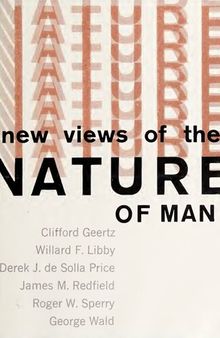دانلود کتاب New Views of the Nature of Man
by John R. Platt|
|
عنوان فارسی: دیدگاه های جدید از طبیعت انسان |
 دانلود کتاب
دانلود کتاب
 جزییات کتاب
جزییات کتاب
In every major field of the natural and social sciences the remarkable developments of the mid-twentieth century have led to potentially dramatic revisions in our views of man and of his place in the universe. But too often these new views have been discussed seriously only within the framework of specialist disciplines.
The object of these essays—based on a series of lectures given at The University of Chicago—is to provoke a new discussion of the nature of man and his biological, intellectual, and social potentialities. Each author is a pioneer in his own field.
Willard F. Libby, 1960 Nobel Prize-winner in chemistry for his work in radiocarbon dating, characterizes man’s unique quality as “the principle of intelligence.” He concludes that “man’s place in the physical universe is to be its master, or at least to be the master of the part that he inhabits.”
George Wald, well known for his contributions to our knowledge of the eye and the biochemistry of the retina, tackles the problem of free will versus determinacy through a consideration of the emergence of individuality in living organisms.
Derek J. de Solla Price, physicist and historian of science, explores the use of scientific methods to analyze the struc¬ ture of science and the behavior of scientists in a way that may lead to efficient planning in the future.
Roger W. Sperry, an authority on neural growth and the architecture of the brain, questions whether the materialistic view of mental activity is adequate to explain the integrative and unitary aspects of behavior.
Clifford Geertz illuminates the goals of his own discipline, anthropology: “It may be in the cultural particularities of people—in their oddities—that some of the most instructive revelations of what it is to be generically human are to be found.....”
James M. Redfield discusses the relationship between the sense of crisis and the idea of progress. As a historian, he compares the situation of the late fifth- century Greeks with our own: “As they, seeking to realize the human world, created the means for dehumanizing the world, so we, seeking to perfect nature, have created the means for destroying it. Power again has outrun purpose.”









 این کتاب رو مطالعه کردید؟ نظر شما چیست؟
این کتاب رو مطالعه کردید؟ نظر شما چیست؟
